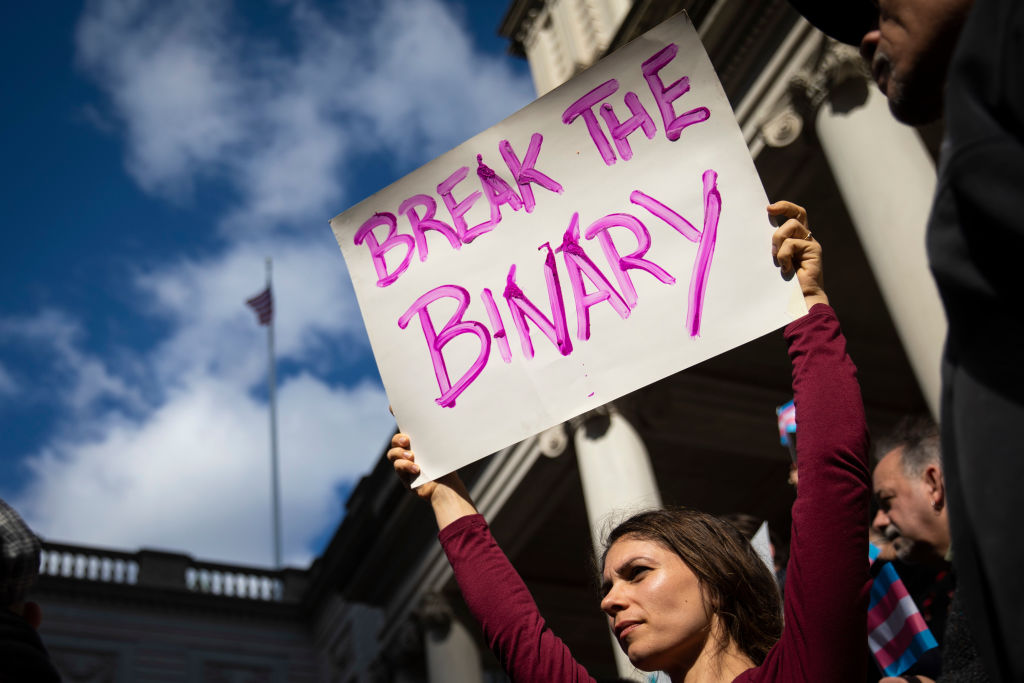It has been more than 100 years since women got the vote. We’ve had two female prime ministers. The #MeToo movement has been and gone. And yet people are still suspicious of what women say. Has the battle for equality been won? I’m not convinced.
In the last few weeks we have seen: a best-selling author’s books set on fire after she was branded a ‘Terf’; a Ted talks series for females change the word women to ‘womxn’; the Irish health service remove references to ‘women’ on its information page on cervical smears; the Lib Dems devising a definition of ‘transphobia’ that effectively silences women who have the wrong opinions about ‘gender identity’; and a writer told that the word ‘female’ – which she had used in her book reviews – has ‘pejorative connotations’.
Does this happen to men? As far as I can tell, man hasn’t been changed to mxn; ‘people with a penis’ has not been used on posters about prostate cancer; and no one says the word male might be ‘pejorative’. Yet when a female dares says anything against these erasures of our womanhood, they are labelled by some as hateful transphobes.
Three years ago, Brendan O’Neill wrote in this magazine about how the very words to define the female of the species were coming under attack. At the time, the phrase ‘pregnant women’ had already been deemed by some to be non inclusive, while the BMA said doctors should stop saying ‘mothers-to-be’ and instead say ‘pregnant people’. He predicted that if you discarded the word woman, the female spaces would be next. He wrote:
‘Women-only shortlists in politics, women’s institutions, women’s sports teams – all could potentially be intruded upon by men who identify as woman.’
All of that has come to pass. But what he didn’t predict was just how much of a backlash there would be against the people who dared to speak up against this new illiberal orthodoxy. Women such as JK Rowling who speak out against what is taking place – even while empathising with transwomen and transmen, and wanting them to be included in these conversations – are deemed to be beyond the pale.
Many women, of course, don’t want their word to be changed to womxn. The word is broad enough that it should already include everyone who considers themselves to be a female, whether they have a period, a cervix or breasts or not.
Women don’t want to be called menstruators; they don’t want to be defined by whether they bleed once a month. In some cultures, having your period means you are dirty; women don’t want to be labelled something which, for many, is a source of shame, discomfort and bullying.
Women do, however, want to be told they have a cervix. The charity Jo’s Cervical Cancer Trust found that 44 per cent of women did not know what a cervix is, so it stands to reason that if you are trying to get people to have a smear test, you have to spell out that they need one. The term ‘people with a cervix’ means nothing if you don’t know you are a person with a cervix. This is where political correctness becomes dangerous.
But while many women agree with me on these points, those who speak up risk a predictable reaction. Justifying its decision to opt for the word ‘womxn’ over ‘women’, TEDxLondon made clear its distinct distaste for those women who did not agree: ‘The invasive conversation we have witnessed from public figures, sensational journalists and others who want to sow hatred, fear and division has only strengthened our resolve to stand in solidarity and allyship.’
The saddest thing is that this emerging trend – sometimes driven by people who are neither trans nor female – divides women from transwomen and transmen when they often want the same thing; safety and respect. Dr Debbie Hayton, who is a transgender writer for The Spectator, has written movingly about how trans people like her just want to get on with their lives without usurping women’s rights. Buck Angel, who transitioned to become a man 25 years ago, tells me:
‘This new language situation is hurting more than helping. There is a lot of anger that is coming from all of this; it is not a good thing. The majority of us can see that we can make this work by co-existing, but there are some people who have been socialised as males and are refusing to listen to women. I find it hurtful because they don’t seem to want to understand that women have been fighting for their rights for centuries. If they had more compassion, they would understand why women are saying what they are saying.’
The erasure of words which depict and describe femaleness – particularly from so-called woke organisations who say they are on our side – undermines everything women have ever fought for. Those who insist on erasing ‘women’ need to start listening and stop calling us bigots. Otherwise it is as if #MeToo never happened.






Comments